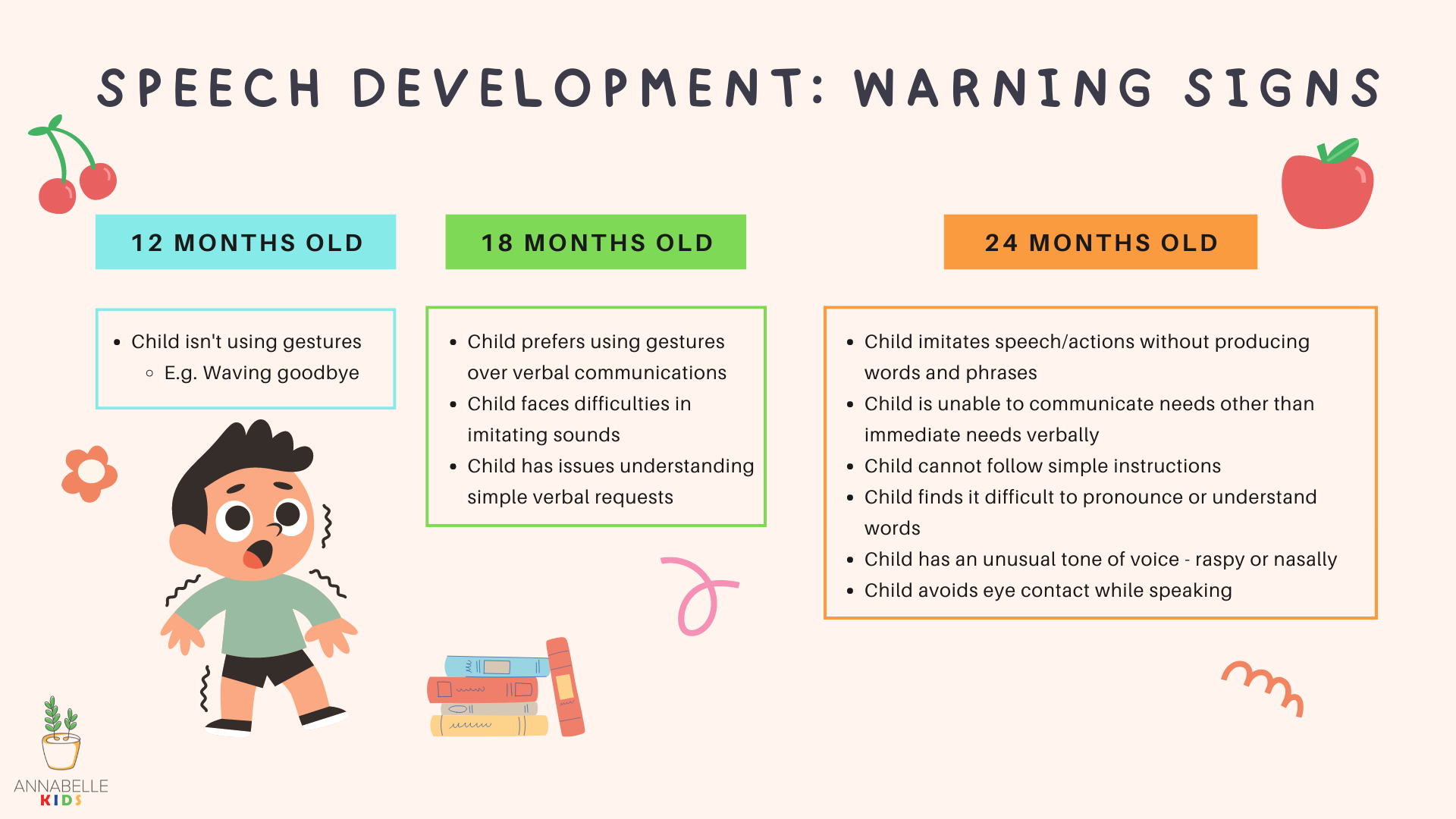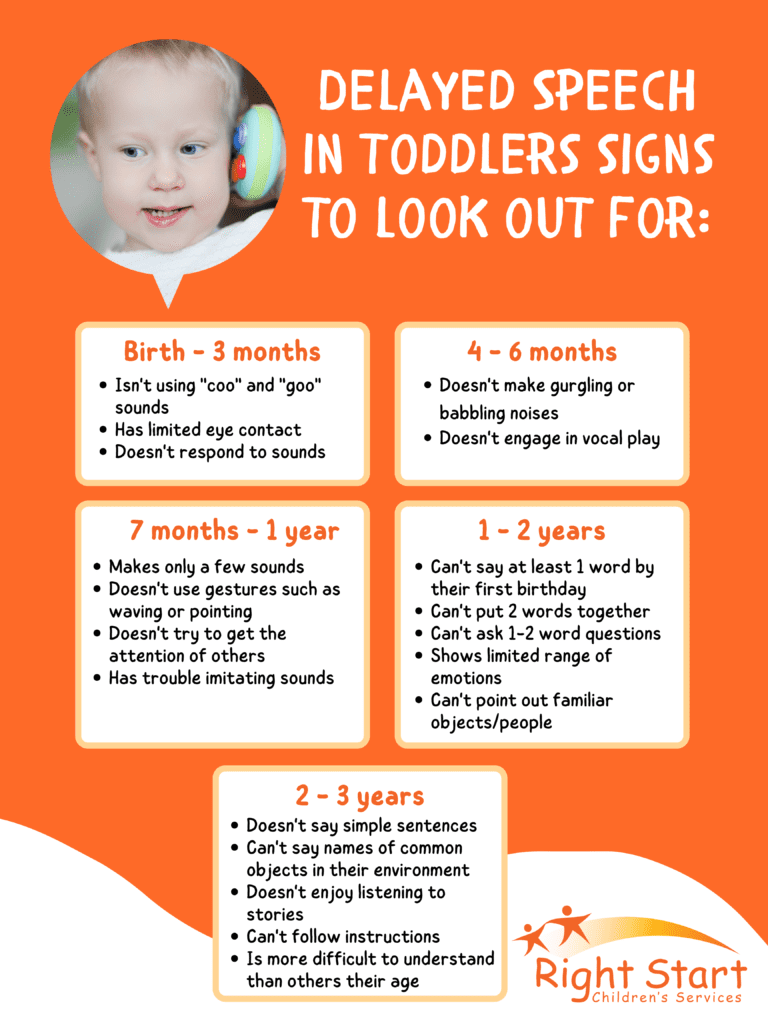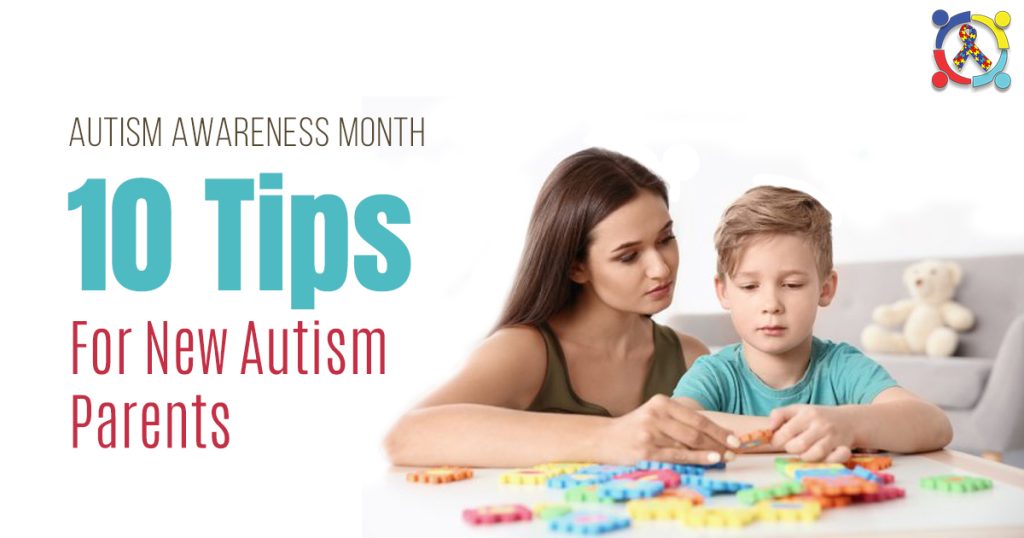Are you concerned about your child’s speech development? It’s natural to wonder if your little one is on track with their communication skills.
As a parent, you want to ensure your child is thriving in all aspects, including their ability to express themselves verbally. Speech delay can be a daunting topic, leaving you questioning what is considered normal and when it might be time to seek help.
Imagine the peace of mind knowing exactly when to take action and how to support your child’s language growth. We’ll explore the signs of speech delay that you should watch for and provide you with practical steps to support your child’s speech development. Stay with us to discover the essential information that could make a significant difference in your child’s life.

Credit: www.annabellekids.com
Early Milestones In Speech Development
Understanding early speech milestones helps in identifying potential speech delays. Babies and toddlers exhibit specific speech patterns as they grow. Observing these patterns can guide parents in supporting their child’s language journey.
Typical Speech Progression
Speech development begins soon after birth. By 3 months, babies coo and make gurgling sounds. At 6 months, they start babbling with varied sounds. Around 9 months, babies use a wider range of sounds and tones.
By their first birthday, most babies say “mama” and “dada.” Between 12 to 15 months, they start using simple words. By age 2, toddlers form two-word sentences and understand simple questions.
Age-appropriate Language Skills
At 18 months, children should have a vocabulary of about 10 words. By age 2, they should know 50 words and use simple phrases. At age 3, they typically use sentences with three to four words.
By age 4, kids speak in clear sentences and understand basic grammar. They can tell stories and follow multi-step instructions. Observing these skills helps in detecting any speech delay early.
Common Causes Of Speech Delay
Speech delay can concern many parents and caregivers. Understanding the common causes helps in addressing the issue early. Some children may simply develop at their own pace. Others might need extra support to overcome hurdles. Below are some typical factors leading to speech delay.
Hearing Impairments
Hearing plays a crucial role in speech development. Children with hearing impairments may struggle to learn words. They might not hear sounds clearly or at all. This affects their ability to mimic and practice speech. Regular hearing checks can identify issues early. Early intervention can significantly help.
Developmental Disorders
Some developmental disorders impact speech. Autism spectrum disorder often affects communication skills. Children with these disorders might find speaking challenging. They may also have trouble understanding others. Early diagnosis and therapy can improve speech abilities. With support, many children make progress.
Environmental Factors
The environment influences a child’s speech development. Lack of interaction can delay speech. Children learn by listening and talking with others. A quiet or unstimulating environment can hinder their growth. Engaging children in conversations boosts their language skills. Reading and playing also enhance speech development.
Key Signs Of Speech Delay
Parents may worry about speech delay if a child isn’t speaking by age two. Limited vocabulary or struggles to form sentences can be signs. Early intervention can help address these challenges effectively.
Recognizing the key signs of speech delay in children can be crucial for early intervention. It’s natural for parents to worry about their child’s communication skills. But how do you know when it’s more than just a phase? Observing specific indicators can guide you in making informed decisions. Let’s explore these signs together.
Limited Vocabulary Growth
Children typically expand their vocabulary rapidly between the ages of one and two. If your child uses fewer words than peers, it might be worth paying attention. You may notice your toddler struggles to name familiar objects. Or perhaps they rely on gestures instead of words to communicate. Do you often find yourself interpreting their needs rather than hearing them express directly?
Difficulty In Forming Sentences
By age three, children usually start forming simple sentences. If your child is still using one-word phrases or has trouble stringing words together, it could be a sign of delay. You might hear them say “milk” instead of “I want milk”. This difficulty can impact their ability to express complex thoughts. Could this be affecting their social interactions?
Unclear Speech Patterns
Speech clarity is another vital aspect of communication. If your child’s speech is hard to understand, even for family members, it might indicate an issue. You may notice repeated sounds or unusual pronunciations. This can be frustrating for both you and your child. How often do you ask them to repeat themselves to grasp their message? Identifying these signs early can empower you to seek guidance from professionals. Remember, every child develops at their own pace, but being proactive can make a difference. Don’t hesitate to reach out for support if you suspect speech delay. Your vigilance could be the key to helping your child thrive.

Credit: www.rightstartservices.com
When To Seek Professional Help
Parents may worry about speech delay if their child is not speaking words by 18 months. Concerns grow if a child struggles to form simple sentences by age 2. Consulting a speech therapist can help identify any underlying issues and provide guidance for improvement.
Parents often wonder about their child’s speech milestones. Watching a toddler struggle with words can be concerning. Knowing when to seek help is crucial. Professional guidance can ease worries. It ensures proper growth and development.
Consultation With Pediatricians
Pediatricians are the first step in assessing speech delay. They know typical speech patterns. Regular visits help track progress. If concerns arise, they provide advice. Pediatricians can refer specialists if needed.
Speech Therapy Evaluation
Speech therapists assess communication skills. They identify speech issues early. Therapy sessions focus on improvement. They use tailored exercises for each child. Evaluations help understand specific needs.
Role Of Early Intervention
Early intervention is vital for speech delay. It offers timely support. It improves language skills quickly. Engaging children in interactive activities is key. This boosts their confidence and ability to speak.
Impact Of Speech Delay On Child Development
Speech delay in children can have significant impacts on development. Effective communication is crucial during early years. It influences social, academic, and emotional growth. Understanding these impacts helps parents and educators support affected children.
Social Interaction Challenges
Children with speech delays often face social difficulties. They may struggle to make friends. Expressing thoughts and feelings becomes challenging. This can lead to isolation. They may feel left out in group activities. These challenges affect their confidence. Supporting their communication needs is essential.
Academic Performance Concerns
Speech delay can hinder academic progress. Language skills are foundational for learning. Difficulty in understanding instructions can affect classroom performance. They may struggle with reading and writing. This impacts their ability to keep up with peers. Early intervention can help bridge these gaps.
Emotional And Behavioral Effects
Speech delay can lead to emotional distress. Frustration from communication struggles may arise. They might exhibit behavioral issues. They often feel misunderstood by others. This can affect their self-esteem. Encouraging open communication can alleviate these effects.

Credit: www.sounderic.com
Strategies To Support Speech Development
Signs of speech delay in children can cause concern for parents. Early intervention strategies support speech development effectively. Consulting a speech therapist ensures tailored guidance for your child’s needs.
Supporting your child’s speech development can feel overwhelming, especially if you’re concerned about a potential delay. However, there are practical strategies you can use daily to encourage progress. Engaging activities and tools can make a significant difference in fostering your child’s communication skills. Here’s how you can help.
Interactive Reading And Storytelling
Reading together is more than just a bedtime ritual; it’s an opportunity to boost speech development. As you read, pause frequently to ask questions about the story. What do you think will happen next? This encourages your child to think and express their ideas. Storytelling can also be interactive. Encourage your child to finish sentences or predict story outcomes. When my niece was struggling with speech, we started creating our own stories. She loved adding her own characters and plots, which sparked her interest in language.
Encouraging Conversation
Conversations are key to developing speech. Engage your child in discussions about their day, their feelings, or even their favorite toys. Ask open-ended questions that require more than a yes or no answer. Children learn by example. Speak clearly and use varied vocabulary to expand their language. When my son was hesitant to speak, we made a game of talking about everything we saw during our walks, which gradually improved his confidence.
Use Of Visual Aids And Tools
Visual aids can be powerful allies in speech development. Picture cards, storyboards, and interactive apps can help children connect words with images. These tools make learning fun and memorable. Consider using technology wisely. Apps designed for language development can provide engaging and interactive ways for children to practice speech. However, balance is key. Too much screen time can be counterproductive. What strategies have you found effective in supporting your child’s speech development? Share your experiences and insights. By trying different approaches, you can find what resonates best with your child.
Resources For Parents And Caregivers
Identifying speech delays in children can be challenging. Parents and caregivers often seek guidance and support. Knowing where to find resources can make a difference. These resources offer information and community support. They help navigate concerns about speech development.
Support Groups And Communities
Joining support groups can offer comfort and advice. Parents can connect with others facing similar challenges. These groups provide a space to share experiences and tips. Online forums and local meetups are valuable. They foster a sense of belonging and understanding.
Educational Materials
Educational materials offer insights into speech development. Books, articles, and online courses can be helpful. They cover topics like milestones and speech exercises. Visual aids and interactive tools simplify complex information. These resources enhance knowledge and confidence.
Professional Services
Professional services provide expert guidance. Speech therapists can assess and develop personalized plans. Pediatricians and specialists offer medical insights. Early intervention services are available for young children. These professionals ensure the child receives appropriate care.
Frequently Asked Questions
What Are The Red Flags For Speech Delay?
Red flags for speech delay include lack of babbling by 12 months, no words by 18 months, and difficulty understanding simple requests. Limited vocabulary growth, unclear speech by age 3, and struggles with social interaction are also concerning signs. Early intervention is crucial for addressing these issues effectively.
At What Age Is Speech Delay Concerning?
Speech delay is concerning if a child isn’t using simple words by 18 months or short phrases by age 2. Early intervention is crucial for addressing any underlying issues effectively. Always consult a healthcare professional for personalized advice and evaluation.
Regular monitoring helps in assessing speech development.
When Should I Be Concerned About Speech Development?
Be concerned if your child isn’t babbling by 12 months or speaking simple words by 15 months. Consult a speech therapist if your child struggles to communicate or understand simple instructions by age 2. Early intervention is crucial for effective speech development.
Always monitor progress and seek professional advice.
At What Age Should I Worry That My Child Is Not Talking?
Consult a pediatrician if your child isn’t talking by age 2. Early intervention can aid language development. Monitoring progress and seeking professional advice is crucial for addressing potential speech delays effectively.
Conclusion
Parents often worry about speech delay. It’s natural. Trust your instincts. Early intervention can help. Seek advice from professionals if concerned. Every child grows at their own pace. Comparing them to others can be stressful. Focus on your child’s unique journey.
Celebrate small victories. Encourage communication through play and conversation. Regularly read to your child. This builds vocabulary and confidence. Support and patience are key. Remember, you are not alone. Many parents face this challenge. Stay informed and proactive. Your involvement makes a difference.

